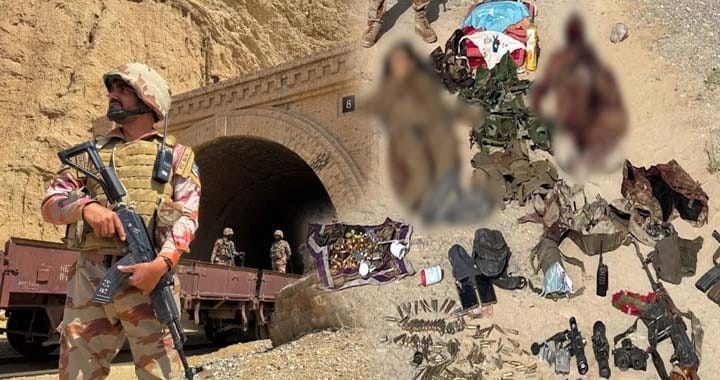Despite a wave of targeted attacks on development initiatives across Balochistan by banned separatist groups, Pakistan’s security forces have made significant breakthroughs this year in dismantling foreign-sponsored terror networks operating in the province and across its borders.
According to official reports, 30 attacks were carried out between January and September 2025 by the Baloch Liberation Army (BLA) and Baloch Liberation Front (BLF)، outfits designated as terrorist organisations, and widely believed to receive material and logistical support from India’s Research and Analysis Wing (RAW). Authorities say their objective is to disrupt infrastructure progress and sustain a false narrative of isolation and underdevelopment in Balochistan.
“These acts are not about resistance; they’re about regression,” said a senior provincial official. “They’re trying to burn the future of the people they claim to represent، but they’re failing.”
Targeting Progress: Development Projects Attacked
The militants primarily targeted infrastructure linked to the federal government’s Vision 2030 and Khushhal Balochistan initiatives؛ programmes aimed at improving road connectivity, digital access, water and energy supply across underdeveloped regions.
Attacks included:
Arson of construction vehicles in Awaran, Khuzdar, Kharan, Mashkay, and Pasni;
Gun attacks and sabotage of Ufone telecom towers in Kharan and Ras Koh in April;
An arson attack in Turbat’s Nasirabad in February destroying four vehicles;
A gas pipeline bombing in Dhadar on September 21, followed by another strike in Qalat on September 27.
These assaults temporarily disrupted development activity but failed to derail it. Officials say all damaged projects are being resumed with security reinforcements.
Uncovering the Foreign Web: Major Counterterrorism Gains
In response, Pakistan’s security forces, often in cooperation with neighbouring countries, have mounted one of the most comprehensive counter-terror operations in recent years.
The most significant breakthrough came with Operation Gidon-Esha, concluded in June 2025 after months of coordinated intelligence work between Pakistan and Iran. The operation dismantled a RAW and Mossad-backed network operating out of Iran’s Chabahar and Balochistan, leading to multiple arrests.
“This was a multi-layered, foreign-sponsored effort to destabilise Pakistan’s territorial integrity,” a senior security official said. “It’s been disrupted from the inside out.”
In addition to Gidon-Esha:
The arrests of Usman Qazi and his close associate Mir Khan Muhammad exposed financing and training networks tied to India and Israel.
The killing of senior BLA commander Zubair Baloch, followed by the capture of his accomplice, revealed further foreign funding routes and cross-border coordination details.
Expanded Operations Across Balochistan
Pakistan’s military and law enforcement have also launched a series of intelligence-based operations (IBOs) this year to neutralize threats, protect development projects, and secure border regions. These include:
January (Kacchi District): 27 terrorists killed in a major IBO; weapons and explosives seized.
February (Kalat & Harnai): Multiple operations resulted in 23 terrorist deaths across central Balochistan.
April (Turbat / Kech): 3 terrorists killed; arms and communication equipment recovered.
May (Musakhel District): Militants intercepted while planting roadside bombs; 4 terrorists neutralized.
September (Sherani): Seven militants affiliated with BLA offshoots eliminated during a raid after a car bombing incident near Quetta.
Operations like Pehrud, Zehri, Mach, and the four-day clearance mission in the Sambaza region successfully foiled infiltration attempts by TTP militants, including Afghan nationals allegedly facilitated by elements of the Afghan Taliban. Security forces also reported busting safe houses and recovering advanced IEDs, satellite phones, and propaganda materials.
Securing Development, Resisting Destabilisation
Security forces have now established permanent checkpoints, increased surveillance patrols, and provided escorts for contractors working in high-risk areas. Officials insist the attacks have slowed but not stopped development work.
“These attacks are tactical irritants, not strategic setbacks,” said a senior federal official. “The state isn’t retreating, it’s reinforcing.”
People vs Militants: Local Resistance Growing
Community leaders across Balochistan are increasingly condemning separatist violence, identifying it as foreign-backed sabotage that harms local livelihoods.
“The real deprivation comes not from the government, but from those burning schools, roads, and water supply systems,” said a tribal elder in Turbat. “These groups work for outsiders, not for the Baloch people.”
Geostrategic Stakes: CPEC in the Crosshairs
Analysts believe Balochistan’s central role in the China–Pakistan Economic Corridor (CPEC) has made it a prime target for disruption by hostile actors.
“Unable to confront Pakistan directly, India uses proxies to derail connectivity projects vital to regional integration,” said a security analyst in Karachi. “But that strategy is faltering as these groups lose ground and public support.”
Resilience Over Sabotage
Despite repeated attacks, Balochistan’s strategic development vision remains on course. Officials reaffirm that infrastructure projects will continue, with even stronger security measures and greater local engagement, in defiance of those trying to destabilise the province through violence and misinformation.
“What’s being built here is not just roads and schools,” said a provincial official. “It’s a future that, with the unwavering support of the people of Pakistan, no amount of sabotage can erase.”





